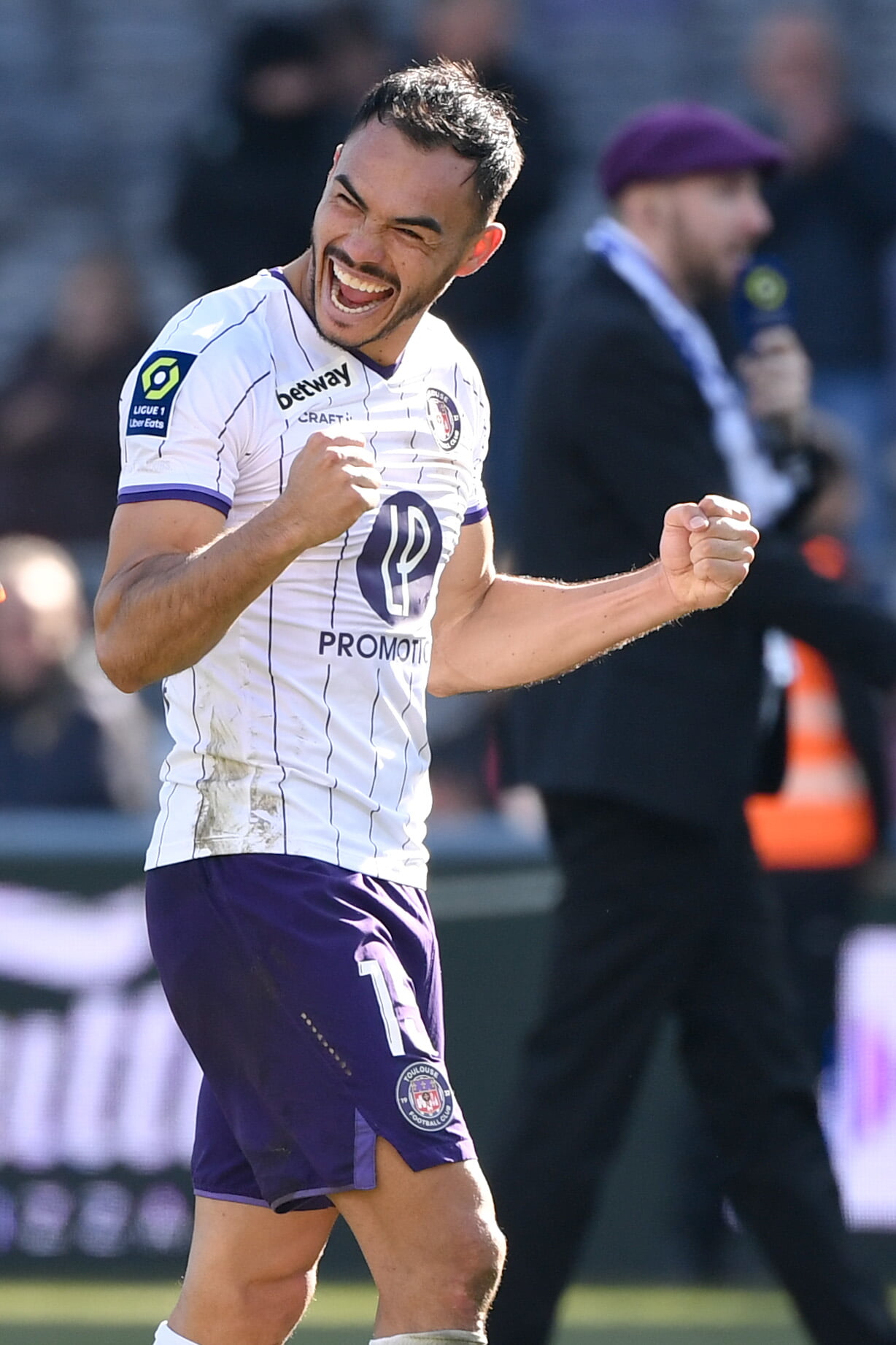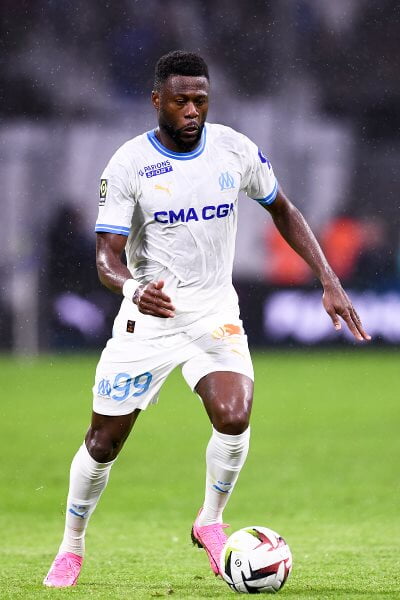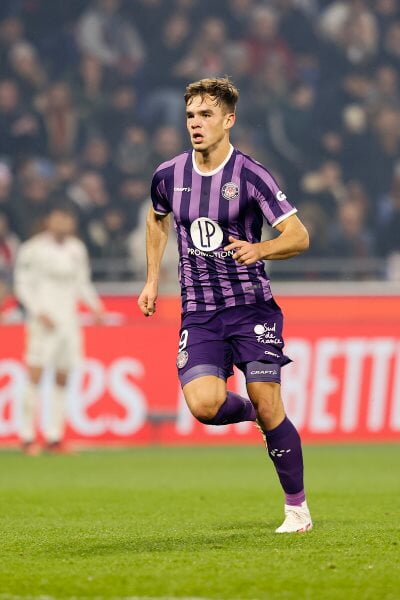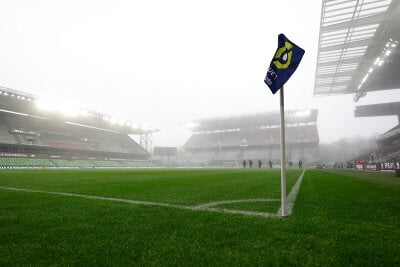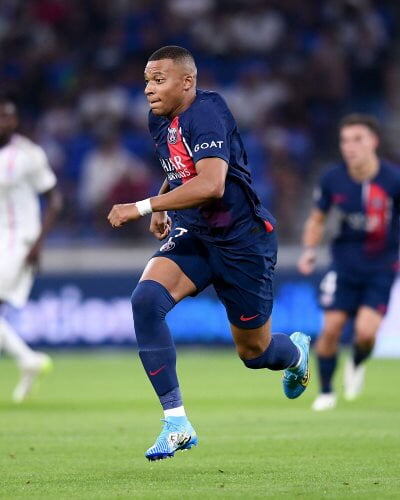As part of the Chilean national team, Toulouse full-back Gabriel Suazo stands out not only for his skills on the field but also for his charismatic interviews. Ligue 1 recently had the chance to chat with Suazo about his leadership role at Toulouse FC, his thoughts on fellow Chilean player Alexis Sánchez, his gritty mentality, his nicknames, his connection to Colo-Colo, and, surprisingly, even his interest in tennis.
As part of the Chilean national team, Toulouse full-back Gabriel Suazo stands out not only for his skills on the field but also for his charismatic interviews. Ligue 1 recently had the chance to chat with Suazo about his leadership role at Toulouse FC, his thoughts on fellow Chilean player Alexis Sánchez, his gritty mentality, his nicknames, his connection to Colo-Colo, and, surprisingly, even his interest in tennis.
First, could you tell us about your childhood in Chile and your relationship with football?
"It might surprise you, but I have photos of myself at age two, playing with a soccer ball and wearing the Colo-Colo jersey (the most popular club in Chile). I was too young to remember, but I was already with a ball! My mother told me that afterward, whenever there was a day off from school, I would wake up at dawn and go wake up all my little neighbors so we could play together. I also played with my brother's friends, who were all five years older than me, and since I was the smallest in the group, they put me in goal. They gave me huge gloves, the ones you use when it snows so that I wouldn't get hurt... And they would light me up (smile)! At that age, a five-year gap makes a significant difference! That's how I fell in love with football. It's an almost innate love. As far back as I can remember, I've always loved football, and I'll always love this fantastic sport."
So, you mentioned wearing a Colo-Colo jersey when you were only two years old. Does that mean your family are big supporters of the club?
"Exactly, I come from a family where almost everyone supports Colo-Colo: my parents, my grandparents... I said 'almost everyone' but it's actually everyone! And I was fortunate to be part of Colo-Colo's youth teams since I was eight or nine years old. I then made my professional debut there, became captain, and won the Chilean championship with the armband... My story with Colo-Colo is fantastic, and it's something that will stay with me forever."
As a child, you didn't just play football; you also practiced tennis...
"Yeah, I got into it around seven or eight, and honestly, I was pretty good at it. You can even see a few trophies back at my folks' place to back that up (grinning). They used to call me 'Marcelo Ríos' (Chilean tennis player, former world No. 1) because, like him, I rocked the two-handed backhand while jumping! I mean, I never actually watched him play because I'm too young for that, but when people brought him up, I checked out some videos, and yeah, I can see the resemblance in our playing styles. The funny thing is, hitting a backhand like that isn't the easiest technique (chuckles), but for me, it just felt natural, you know? It was just my thing."
And then?
"Until the age of 13-14, I played tennis and soccer equally. However, I had to make a choice later on because at Colo-Colo, things were getting serious with almost daily training sessions. When I was younger, I dabbled in various sports, and even today, I enjoy watching a variety of sports, especially tennis and padel."
I hope you managed to squeeze in some school time between playing soccer and tennis.
"Of course! School was actually going really smoothly for me as well. I managed to maintain a pretty high average, hovering around 6.7 or 6.8 every year. It's interesting because in Chile, our grading system tops out at 7, unlike in France. My parents were big on stressing the value of education, and they made it clear that I couldn't pursue my own interests if I didn't keep up with my studies. I'm grateful for that push they gave me, and it's become even more apparent to me over time just how crucial a good education is, especially for handling interviews well!"
When talking about your arrival in France in January 2023, it seems that Eduardo Berizzo, the former Argentine player and coach of the Chilean national team, played a crucial part in getting you signed with Toulouse FC.
"Eduardo knew that I had the opportunity to go to Europe, which was one of my goals and dreams as a professional player. He told me not to hesitate to consult him if I had any questions or needed information about certain destinations. He wanted to help me because he had played and coached in Europe (having notably played for OM and Celta de Vigo before coaching in La Liga). When I told him about Toulouse's interest, he was very happy for me and fully supported the idea. He told me that the French league was highly competitive and physical, which could greatly aid in my development. Indeed, the league is just as he described, so I thank Eduardo for his advice. I am very happy to be here and to fulfill my dream."
How did your adaptation go?
"Everything went smoothly. It was my first time leaving Chile, but after two weeks, I began training with Toulouse FC. My teammates were incredibly supportive, which helped me integrate quickly. Initially, I found it challenging with the language barrier in French, but after several months, I made significant progress in understanding and speaking English. Additionally, I joined a club where some of the coaching staff spoke Spanish, which aided in communication. On a personal note, my wife joined me in France almost immediately, which meant a great deal to me. Overall, I was eager to come to Europe and establish myself as quickly as possible, so I made every effort to shorten the adaptation period."
💜 Suazo is everywhere 🥵@ToulouseFC || #UEL pic.twitter.com/lRZPVKd4IF
— UEFA Europa League (@EuropaLeague) October 16, 2023
It might come as a bit of a shock to shift gears so quickly, especially after spending 16 years in the familiar surroundings of Colo-Colo...
"It's true that many people believe that when you leave Chile, it might be a good idea to go to Argentina or Brazil as an intermediate step before heading to Europe. Some players who arrive in Europe do encounter difficulties, but for me, I was certain I wanted to come here and I was convinced I would play. This determination, no one could take it away from me. On the contrary, the more people told me it would be difficult, the more convinced I was that I had to come to Europe and that it would work out for me here. And that's what happened on the field."
Besides your experiences on the pitch, have you encountered any challenges in your life here in France?
"To be honest, it was hardest or most drastic for my wife, I'd say. When we arrived here, she was pregnant. I'm immensely grateful to her for making that sacrifice because it wasn't easy for her to leave Chile and distance herself from her family during that time. Coming here, far from her mother, far from mine whom she gets along with very well, to give birth to our son in a country where you don't know the language, where you don't have your bearings... There's also someone from the club who helped us a lot in our daily lives, but she couldn't always be there either. For all of that, I tip my hat to her. It's thanks to my wife that I was able to focus on the field and on my performances as I did. Her support means a lot. So I think it's this double change, of city and of life, that was the most complicated for us in France, but I'm very happy with how we've been treated here, as if we were French. And I'm very happy that our son was born in Toulouse, especially since I adore the way French people are..."
That is to say?
"I really appreciate the warmth of the French people. Similarly, Chileans are warm too, although there are exceptions, of course. But here, I find people to be exceptionally warm, close-knit, and affectionate. Despite the stereotype that Europeans are more reserved compared to us South Americans, my experience here contradicts that notion. Whenever I'm out in the city or need assistance, I start speaking Spanish and my interlocutors often make an effort to understand and respond in Spanish. People genuinely try to make life easier for you here, which is something I cherish and it has certainly eased my adaptation process. The residents of the city and the fans of Téfécé have welcomed me with open arms, and whenever they recognize me on the street, they express their affection, which is incredibly gratifying. Being showered with so much warmth and affection, especially in a country like France, which is so far from my own, truly warms my heart."
You mentioned Toulouse supporters, some of whom refer to you as "Suazidane." Are you aware of the origins of this nickname?
"(Laughs) Oh, this nickname has been following me for quite some time, all the way back to my days in Chile! It actually started as a meme, something people just made up for a good chuckle. There were variations like 'Suazidane' and 'Suazinho' floating around. And somehow, it stuck even after I left Chile! Even the little ones in Toulouse, where I am now, greet me with that nickname. Personally, I much prefer being called 'Gabi' - it suits me just fine. But you know how it goes, especially in Chile; people love a good joke, so "Suazidane" or "Suazinho" it is! Looks like I'll be hearing that for a while longer!"
A nickname related to Zidane really adds pressure!
"Wow, there's definitely some pressure there (laughs)! Having a nickname like that really piles on the pressure (laughs)! But hey, I'm giving it my all out there on the pitch and trying to show love back to the fans. Everyone's entitled to their own nicknames for me, but honestly, 'Gabi' works just fine for me!"
SUAZO 🇨🇱🔥#TFCASM I @ToulouseFC pic.twitter.com/LtntmSmsxL
— Ligue 1 Uber Eats (@Ligue1UberEats) December 22, 2023
As you mentioned earlier, you used to wear the captain's armband at Colo-Colo. When you've been a leader for so long and you arrive in a country where you don't speak the language, how do you manage to convey motivation or advice to your teammates?
"Certainly, in the beginning, I couldn't express myself as I wanted to, but now it's much better, and I understand much more. The same goes for English, which I spoke very little of when I arrived. Despite all that, I felt like a leader because of what I conveyed on the field with my attitude. Most of the time, words aren't necessary."
Could you clarify?
"How you carry yourself on the field has a big impact – it can either lift your teammates up when times are tough or drive them to excel even more when things are going well. In Toulouse, our team is made up of players from many different countries, so we often communicate in English during games. Despite knowing only a few English words, I made an effort to convey my enthusiasm and energy to my teammates. I strongly believe that energy is contagious, so I strive to be a source of positivity, hoping to inspire and uplift my teammates. It's essential to maintain a positive mindset on the field and never lose hope. 'Como perro!'"
Excuse me?
"Ah, you know, it's like being a dog (laughs). It's about having that 'dog mentality,' if you will. I kind of adopted it as my motto, even had it stitched onto my captain's armband back in Colo-Colo. It's all about never letting a ball slip away. You throw a ball to a dog, it doesn't matter where it goes, that ball's coming back to you. So, I strive to embody that attitude every moment I'm on the field. 'Like a dog'—that's a little mantra passed down to me by some of my old teammates at Colo-Colo, Jaime Valdés, Esteban Pavez, and Claudio Baeza. I've really taken it to heart, you know? Whether I'm playing in Santiago or Toulouse, that mindset stays with me, guiding my every move on the pitch."
You've won numerous titles with Colo-Colo, and you brought that winning mentality with you, as evidenced by lifting the Coupe de France with Toulouse last season. Did you expect to be able to win trophies here?
"When I arrived in Toulouse, it was just before a French Cup match, precisely a Round of 16 that we had won at home (2-0 against Ajaccio). I immediately thought to myself, 'Why not us? Why couldn't it be us?' I didn't say it to anyone at the time, but that's what I was thinking. It's a competition with very strong teams, but in one match, anything is possible. Above all, I always intend to win. We were fortunate to go all the way, but what matters is wanting to win every match, no matter the competition: cup, league, Europa League... I'm here to win, and that's what I always try to convey."
Currently, you primarily play as a left fullback or left winger with Toulouse. However, back in Chile, you've also had experience playing in midfield.
"During the preseason, Carles Martínez Novell positioned me in midfield for a match against Osasuna, just ahead of the defense. He's aware that I can fill in there if required; we've had discussions about it. Actually, this summer, the coach raised various scenarios and specifically inquired whether we were comfortable playing in positions other than our primary ones, aiming for maximum flexibility. Presently, my natural position is at left-back, which is crystal clear, but if the team needs me elsewhere, I'm ready and willing. It's not an issue. I have significant experience playing in midfield with Colo-Colo (almost 80 matches). There's even a season where I operated in that role, scoring several goals and providing numerous assists. But then I transitioned to the wing (laughs)."
So, did you train as a midfielder, then?
"I've played almost everywhere! When I started, I was a left midfielder, then I transitioned to a left winger, almost a forward. After that, I played as a No. 10, then midfield in front of the defense until I was 15 or 16. After that, Claudio Rojas, a coach who had a significant impact on me, moved me to left fullback. He taught me how to position my body, how to slide—concepts that aren't necessarily taught to players so young. This coach also had me play as a left center back, which greatly helped me improve in duels and pure defense. Finally, I settled into midfield, and it's in this position that I made it into the first team, where I played in quite a few different places! Playing in different positions has tremendously helped me progress and understand the game and tactics better. Playing in different places helps you understand what each position entails."
Over the last two and a half years, you've consistently been part of the Chilean team, racking up a total of 24 appearances. Last season, while you were playing in France, you ran into one of your fellow national team members, Alexis Sánchez...
"And there's Guillermo Maripán! As soon as I got to France, he reached out to me right away, letting me know he was there for me if I needed anything. Same with Alexis. When we faced off against Marseille, we exchanged warm greetings, and he reassured me of his support. These gestures really touched my heart. After the match, we swapped jerseys, and I wanted to catch up with him later, but I had to head for doping control. That day, I had to wait so long to pee that by the time I finished, he had already left! But overall, both Alexis and Guillermo assured me that Ligue 1 is a tough league physically, and they were confident I'd do well here."
What does Alexis Sánchez represent in Chile?
"The story and the defining moments of our national team. He's the player with the most caps and the top scorer in the history of the team (162 matches and 51 goals). He was 17 when he first played for the national team, and he has never left the squad since, which is incredible. He embodies the history, and I believe he'll remain at the top alongside Arturo Vidal. I think these two are the greatest, from what I've seen anyway, as I was too young to watch Zamorano and Salas play. I grew up with Alexis and Arturo, so they're the ones I want to highlight!"
Certainly, during your time with the national team, you rubbed shoulders with Arturo Vidal and Gary Medel, two remarkable characters!
"Absolutely! They are part of the golden generation of Chilean football who are still here alongside Claudio Bravo, Mauricio Isla, Eugenio Mena... There's a new generation of players who have joined the group, and we're trying to learn as much as we can from them. This blend is crucial, with players of different ages who get along very well, and it reflects on the field. It's an honor for me to be in the national team and spend time with them."
At Colo-Colo, you played alongside other Chilean football legends such as Jorge Valdivia and Matías Fernández..
"Yes, I've been fortunate to play with many very important players in the history of Chilean football, which allowed me to develop as a player and as a person as well. I've played with Jorge Valdivia and Matías Fernández, but also with Esteban Paredes, a legend of Colo-Colo, with Jean Beausejour, Carlos Carmona... I learned a great deal from being around them, and we've stayed close. If I've become the player and the man I am, it's largely thanks to them. I forgot to mention Gonzalo Fierro, who was one of my idols when I was a child and the captain of Colo-Colo."
More precisely, what did they teach you?
"Professionalism in general. They gave me more advice on what happens off the pitch than on it. And one doesn't always realize it, but what happens off the pitch is at least as important as what happens on it. I understood all of this on a daily basis, exchanging with them in the locker room, during training..."
Can you tell us more about the importance of Colo-Colo in Chile and South America?
"Colo-Colo means everything to many Chileans, especially those from more modest backgrounds. But it's a universal club that brings people together. Perhaps around 80 percent of the supporters are humble individuals who wake up at 5 a.m. and work hard just to afford a meal, and if there's a bit of money left, to buy a ticket to go to the stadium. However, there are also supporters of the club from more affluent classes. Ultimately, it's a passion that cuts across social divides, spanning the entire country, from cities to the countryside. As you know, Chile is a vast country, but whether in the North or the South, it feels like Colo-Colo is playing at home. The stadium always has a strong Colo-Colo presence, which requires players to display a lot of humility and courage, beyond just playing well. They always have to work hard and give their all on the pitch, much like people do in their everyday lives. These are values that have driven me since I was young, and I've carried them with me to Toulouse."
And what about the atmosphere at the Monumental Stadium in Santiago and the fans?
"The fans are fanatic! They're always behind the team, even in tough times, and I know what I'm talking about because we found ourselves fighting not to get relegated a few years ago. When we went to play away games, there were convoys of supporters' cars following the team bus, supporters cheering us on in the villages we passed through... The relationship between the fans and me hasn't always been easy because the results weren't good when I became captain. But people understood that I was a homegrown player and they saw my commitment, which changed their perception of me. They called me 'captain,' which was a huge source of pride for my family and me. If I ever have to become one in Toulouse, I would be the happiest to help the team with my character and way of being. And speaking of fans, in Toulouse, it's something else! Like at Colo-Colo, they're always behind us, in good times and bad. I love Téfécé's supporters. Whether they're 50 or 1,000, they always travel to support us away from home, and I can never thank them enough for that."

